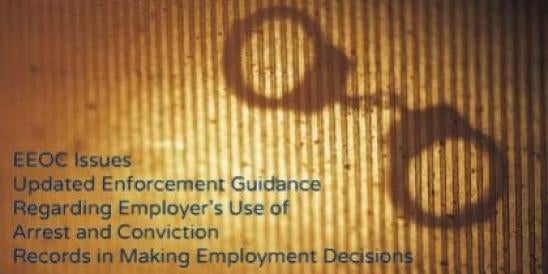This week, the Equal Employment Opportunity Commission (EEOC) issued its much-anticipated, updated enforcement guidance regarding an employer’s use of arrest and conviction records in making employment decisions. The new guidance provides that employers may run afoul of Title VII of the Civil Rights Act of 1964 through (1) disparate treatment of people with comparable criminal histories; or (2) disparate impact on individuals of a certain race, national origin or other protected class caused by the application of their facially neutral criminal history policies, if the employer cannot show a business necessity for a job-related exclusion. The EEOC cites increasing and disproportionate incarceration rates for African American and Hispanic men, employers’ ready access to criminal history data, and Title VII case law as justifications for the new guidance, which had last been revised in 1990.
The EEOC discourages employers from using arrest records to exclude a candidate or fire an employee. “The fact of an arrest does not establish that criminal conduct has occurred.” The agency did concede, however, that although using arrest records alone likely violates Title VII, “an employer may make an employment decision based on the conduct underlying the arrest if the conduct makes the individual unfit for the position in question.” The EEOC notes that convictions are more trustworthy than arrests, but still recommends “that employers not ask about convictions on job applications and that, if and when they make such inquiries, the inquiries be limited to convictions for which exclusion would be job related for the position in question and consistent with business necessity.”
While stating that a showing of job-relatedness and business necessity requires a demonstration that a policy effectively links specific criminal conduct and its dangers to the risks inherent to the position at issue, the Commission gave two examples that it believes will normally meet this threshold:
- The employer validates the criminal conduct screen for the position in question per the Uniform Guidelines on Employee Selection Procedures standards (if data about criminal conduct as related to subsequent work performance is available and such validation is possible); or
- The employer develops a targeted screen considering at least the nature of the crime, the time elapsed since the offense or completion of the sentence, and the nature of the job, and then provides an opportunity for an individualized assessment for people excluded by the screen to determine whether the policy as applied is job related and consistent with business necessity.
Perhaps the most controversial aspect of the new guidelines, this individualized assessment would also include notice to the individual that he has been screened out because of a conviction, a chance for the individual to explain why the exclusion should not apply to him, and the employer’s consideration of the individual’s explanation. Although the EEOC states that this individualized assessment would not always be necessary, the difficulties of this type of assessment have caused much concern for many employers and commentators. Also, even if an employer demonstrates business necessity, the guidance declares that an aggrieved applicant or employee might still prevail in a Title VII claim if an equally effective but less discriminatory alternative employment practice can be shown.
Another controversial section of the new guidelines relates to state and local statutes and regulations. Many states and municipalities automatically disqualify individuals with certain types of convictions from obtaining specific jobs. EEOC’s guidelines expressly provide that such state and local mandates and prohibitions (unlike federal statutes and regulations) will not be an automatic defense if the EEOC believes a company is violating Title VII. Thus, employers could well find themselves in a Catch 22 where compliance with a state law and Title VII protections as interpreted by the EEOC are mutually exclusive. The EEOC has been criticized for failing to take public comment on these guidelines and responds that they represent no policy change, even though they significantly increase employer burdens.
Finally, the new guidelines suggest a litany of best practices, some of which are highlighted below:
- Eliminate “blanket” policies or practices that exclude people from employment based solely on the fact that an individual has any type of arrest or criminal record.
- Develop a narrowly tailored written policy and procedure for screening applicants and employees for criminal conduct. This means identifying essential job requirements and the circumstances under which jobs are performed, and determining specific offenses (using available evidence) that may demonstrate unfitness for performance of that job.
- Determine the duration of exclusions for criminal conduct based on all available evidence, and include an individualized assessment.
- Record the justification for policies and procedures, as well as research and consultations considered in drafting policies.
- When asking questions about criminal records, limit inquiries to records for which exclusion would be job related for the position in question and consistent with business necessity.
- Keep criminal records confidential.
Although these new EEOC guidelines are not binding in federal courts, they represent the way the EEOC will investigate and enforce Title VII relating to the use of criminal histories. Accordingly, employers should review their current policies and applications to determine if potential revisions or assistance from employment law counsel may be necessary. In addition, employers should be mindful that applicable state laws may be more stringent with respect to the use of criminal background checks and the use of arrest and conviction information. Compliance with proper use of criminal background information should apply not just to hiring decisions, but also with respect to promotions, suspensions and terminations. The EEOC also intends to issue guidance regarding the use of credit histories, but has postponed action on that guidance for now.







 i
i


